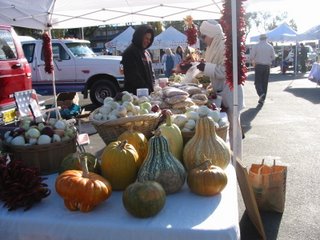
All over the Americas, the Indians grew pumpkins and gourds, and everyone knows that they introduced the early European immigrants to the New World squash family. This photo is from the Farmer's Market in Los Alamos, NM in 2004.
Pumpkins and gourds come in many forms, some hybrid or selected to be decorative, some to be useful as containers or musical instruments, some to make good food. The pumpkin that I cooked yesterday was sold as a "pie pumpkin" though I used it in a centerpiece with decorative gourds for a while. This year, I've noticed a lot of very bumpy, pimply gourds in the decorative bins, as well as the usual edible varieties: acorn squash, summer squash, and so on.
For my taste, pumpkin is much more appealing when it's used in a savory or spicy dish than in sweets like pumpkin pie, pumpkin cookies, or pumpkin cheesecake. Often when traveling, I've looked for interesting recipes for pumpkin soups or stews. In the south of France, there's a traditional recipe for a beef stew with rice and pumpkin. In Italy, pumpkin ravioli. Every Carribean island has a variety of pumpkin soup, some with pork or bacon, some vegetarian. South American cuisine also has many such recipes. I once saw pumpkin soup advertised on a restaurant placard in Canberra, Australia, and have seen it on fall menus throughout the US.
Yesterday, I made a sort of hybrid soup, using what I had on hand in the house: bacon, onion, red pepper, and a few green beans. After trying varieties over the years -- from a chile-flavored soup full of meat and vegetable chunks to a smooth puree of pumpkin, orange, and ginger -- I enjoyed going off on my own tangent.


 The quantity above serves 2 to 3 people. For 6 people, I made a triple batch. You can vary the amount and type of fruit to your taste, you can add sugar, and you can vary the whole-grain component to change the texture.
The quantity above serves 2 to 3 people. For 6 people, I made a triple batch. You can vary the amount and type of fruit to your taste, you can add sugar, and you can vary the whole-grain component to change the texture. All over the Americas, the Indians grew pumpkins and gourds, and everyone knows that they introduced the early European immigrants to the New World squash family. This photo is from the Farmer's Market in Los Alamos, NM in 2004.
All over the Americas, the Indians grew pumpkins and gourds, and everyone knows that they introduced the early European immigrants to the New World squash family. This photo is from the Farmer's Market in Los Alamos, NM in 2004.